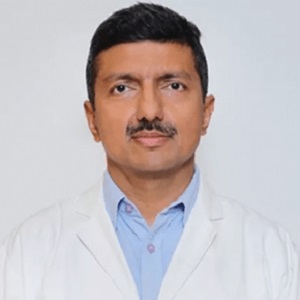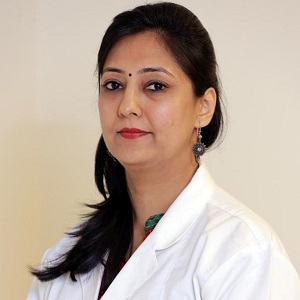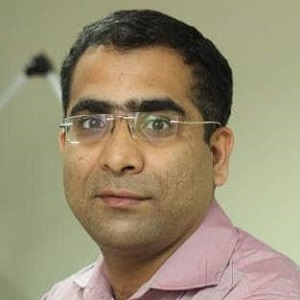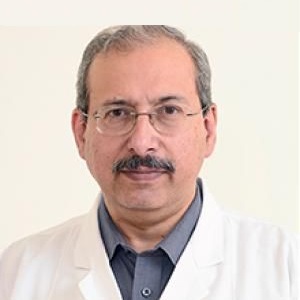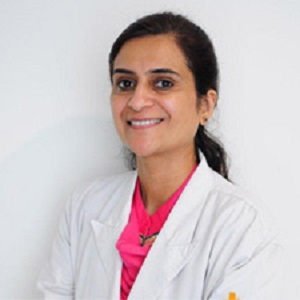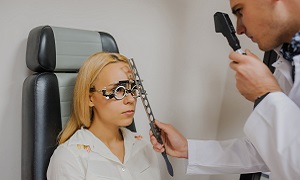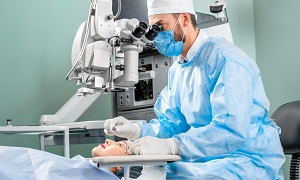Best Doctors in India for Trabeculectomy
- Eye Surgeon, Ophthalmologist, Gurugram, India
- Over 30 years’ experience
Profile Highlights:
- Dr. Sanjay Dhawan is one of the best ophthalmologists in Gurugram. In 1998 he was appointed as Assistant Professor of Ophthalmology at Manipal College of Medical Sciences, Nepal, and associated Himalaya Eye Hospital, a project of FECH of The Netherlands.
- Dr. Dhawan was also among the first to popularize the technique of SICS for mass application in New Delhi, and he probably was also the first to introduce a modified Topical Anesthesia to perform SICS. The large-scale surgical experience helped him refine the surgeries of Phacoemulsification, MICS (Phakonit), LASIK, Supra-Whitnall’s Resection of LPS for Ptosis, etc.
- Ophthalmologist, New Delhi, India
- Over 20 years’ experience
Profile Highlights:
- Dr. Deepali Garg Mathur is a Consultant Ophthalmologist who has completed her DNB from the National Board of Examination & MNAMS from the National Board of Examination.
- Dr. Deepali Garg has expertise in Squint, Paediatric Ophthalmology, cataracts, Lasik, Lasers, Eye Surgery, Corneal, Phacoemulsification, Eyesight problems, Glaucoma, Dry Eyes, Eye Pain, etc.
- Eye Surgeon, Ophthalmologist, New Delhi, India
- Over 30 years’ experience
Profile Highlights:
- Dr. Sonika Gupta is a practicing ophthalmologist with around 30 years of experience. She pursued her MBBS and MS from Aligarh Muslim University.
- Dr. Sonika Gupta is also adept at performing various eye surgeries including Cataract surgery by PHACO, Micro PHACO, LASIK Laser, PRK, Cornea transplants, C3R, other cornea, and anterior segment surgeries and lasers.
- She had undergone Observership and advanced course in PHACO, Corneal diseases, Eye Banking, and LASIK at Cornea & Laser Eye Institute, Tea Neck, New Jersey, USA
- Eye Surgeon, Ophthalmologist, New Delhi, India
- Over 36 years’ experience
Profile Highlights:
- With over 36 years of experience, Dr. Ranjana Mithal is currently practicing at Indraprastha Hospitals in Delhi. Her expertise lies in providing services for diabetic eye ailments, laser eye surgeries, glaucoma treatment as well as phaco-surgery.
- She has also gained additional specialization in LASIK & Neuro-ophthalmology.
- Dr. Ranjana Mithal is a member of several associations as well, such as the Glaucoma Society of India, and the Cataract & Refractive Society of India.
- Ophthalmologist, Eye Surgeon, Gurugram, India
- Over 20 years’ experience
Profile Highlights:
- Dr. Naginder Vashisht underwent observership in Vitreo-retina and ocular trauma under the guidance of Dr. Robert Morris, MD at Retina Specialist of Alabama, USA. Furthermore, he obtained his fellowships from the International Council of Ophthalmology (London) and the Royal College of Physicians and Surgeons of Glasgow.
- Dr. Vashisht’s area of interest in Ophthalmology includes Phacoemulsification, Uvea, Vitreo-retina, and Ocular trauma, and he also has numerous complex and advanced retinal surgeries to his credit. His specialization is in the management of diabetic eye conditions, eye trauma, and retinopathy of prematurity.
- Ophthalmologist, New Delhi, India
- Over 29 years’ experience
Profile Highlights:
- With over 29 years of experience, Dr. Tarun Kapur is one of the most renowned ophthalmologists/eye surgeons based in Delhi.
- Some of the services provided by Dr. Kapur include Avastin Injections, Glaucoma Evaluation / Treatment, Retina Examination, and keratoplasty.
- Dr. Tarun Kapur had also been awarded the National Talent Search Scholarship as well as Junior Science Talent Scholarship.
- Ophthalmologist, Gurugram, India
- Over 15 years’ experience
Profile Highlights:
- Dr. Nidhi Verma is known as one of the best ophthalmologists in Gurugram.
- Her last overseas assignment was as a Consultant at Victoria Hospital Seychelles. Her main fields of interest are Medical Retina, Glaucoma, and Uvea.
- She has also been involved in teaching undergraduate as well as postgraduate students. At Medanta Dr. Nidhi Verma is mainly involved in Preventive Health check-ups and comprehensive Ophthalmology.
- Ophthalmologist, New Delhi, India
- Over 23 years’ experience
Profile Highlights:
- Dr. Uma Mallaiah is a well-known skilled Ophthalmologist and General Physician with 23 years of clinical experience.
- Having attained her educational qualifications from renowned national and international medical institutions, she holds expertise in a number of procedures including Glaucoma treatment, Ectropion, Entropion, LASIK surgery, Phacoemulsification Surgery (MICS), Refractive Surgery as well as Evisceration with Orbital Implant.
- Throughout her career, Dr. Mallaiah is credited with successfully performing 3500 cataract surgeries and 500 glaucoma surgeries. She has also worked with Apollo to set up an Eye Department in Dubai.
- Apart from this, Dr. Uma Mallaiah has also been involved in corporate and international marketing along with organizing camps at the American embassy, Hero Honda, and Indian Oil Corporation.
- Eye Surgeon, Ophthalmologist, New Delhi, India
- Over 20 years’ experience
Profile Highlights:
- Dr. Nikhil Pal did a vitreoretinal fellowship from the University of Wisconsin, Madison, USA.
- As a Senior resident, Dr. Nikhil Pal has independently performed various basic as well as advanced Vitreoretinal surgeries including retinal detachment, vitreous hemorrhage, macular hole, dropped nucleus removal, and gained expertise in medical retina involving Fluorescein angiography/Lasers for diabetic retinopathy, ARMD, vasculitis, ROP and Phacoemulsification cataract surgery among others.
- Ophthalmologist, Gurugram, India
- Over 21 years’ experience
Profile Highlights:
- Dr. Vishakha Kapoor is a renowned ophthalmologist at Medanta Hospital, Gurugram, having over 21 years of experience.
- She provides medical Treatment for Red Eyes, Treatment of Dark circles, Treatment of Eye Pain, Treatment of the Black eye, Eye Itching, Treatment of Conjunctivitis, Weak Eyes, Eye Infection, Tearing Eyes, and Eye Burning.
- Currently, she is also a member of the Delhi Ophthalmological Society.
Best Hospitals in India for Trabeculectomy
Rela Hospital, Chennai
- City: Chennai, India
Hospital Highlights:
- RIMC is a multi-specialty hospital in a sprawling area of 36 acres located in Chromepet, Chennai, Tamil Nadu, India.
- The facility has 450 beds including 130 critical care beds, 9 operating rooms, modern reference laboratories and radiology services, and is conveniently located near road, rail and air transportation.
- RIMC is led and managed by world-renowned physicians committed to healthcare.
- RIMC offers the broadest range of clinical care, education, and research. The hospital offers state-of-the-art technology and modern treatment facilities designed to provide health care at an affordable cost.
- Rela Institute is driven by patient needs, comfort and confidence.
CARE Hospitals, Hyderabad
- City: Hyderabad, India
Hospital Highlights:
- CARE Hospitals were established in the year 2000, by CARE Group.
- The multispecialty hospital has 435 beds, including 120 critical care beds, with an annual inflow of 180000 outpatients and 16,000 in-patients.
- The hospital provides specialty medical services in Cardiology, Cardiothoracic Surgery, Pediatric Cardiology, Pediatric Cardiothoracic Surgery, Neurology, Neurosurgery, Nephrology, and Urology.
- The hospital has the first dual source, 128 slice CT scanner (for high precision cardiac imaging) – the first of its kind in south India.
- The hospital offers a wide range of accommodation facilities for the convenience of its varied patient base, ranging from general wards to super deluxe rooms.
Fortis Hiranandani Hospital, Mumbai
- City: Mumbai, India
Hospital Highlights:
- Fortis Hiranandani hospital was established in 2007.
- The hospital is an advanced tertiary care, multi-specialty hospital equipped with 149 beds.
- The hospital is equipped with a super ICU to provide emergency medical care to critically ill patients.
- The hospital is NABH accredited.
- The critical care facility in the hospital is augmented with the state-of-the-art facilities that facilitate speedier diagnosis and efficient monitoring.
- The hospital provides specialty medical services in cardiology, orthopedic science, pediatric science, neurology, diabetic care, urology, nephrology, ENT, obstetrics, gynecology, cosmetic surgery, bariatric surgery, neuro and spine care.
Fortis Hospital, Anandpur, Kolkata
- City: Kolkata, India
Hospital Highlights:
- Fortis Hospital, Anandapur, Kolkata is a world-class super-speciality equipped with the latest technologies in the medical world.
- The hospital is NABH accredited.
- This state-of-the-art facility specializes in cardiology and cardiac surgery, urology, nephrology, neurosciences, orthopaedics, digestive care, emergency care and critical care.
- The hospital, governed by integrated Building Management System (IBMS), has a pneumatic chute system, for quick vertical and horizontal transportation between floors, facilitating speedy transfer of patient specimens, documents, reports, and medicines to the concerned departments.
- The hospital also has a nephrology department with over 28 advanced dialysis units.
Gleneagles Global Hospital, Parel, Mumbai
- City: Mumbai, India
Hospital Highlights:
- Gleneagles Global Hospital The 450-bed facility comprises of 17-stories, housing state-of-the-art infrastructure, and advanced medical care facilities.
- The hospital offers end-to-end clinical, surgical, and diagnostic services. It is equipped with a team of eminent medical professionals aided by qualified nurses and medical staff
- The Hospital offers advanced Endoscopic procedures, Hepatobiliary and Liver Surgeries, Surgical and Medical Gastroenterology, Bariatric Surgery, and Robotic surgery.
- The hospital is a center of excellence for Orthopedics, Joint Replacement, Knee Replacement, and Hip Replacement surgery.
Jaypee Hospital, Noida
- City: Noida, India
Hospital Highlights:
- Jaypee Hospital is the flagship hospital of the Jaypee Group.
- This hospital has commissioned 525 beds in the first phase and has been planned and designed as a 1200 bedded multi-specialty facility.
- It holds the accreditation of the NABH and NABL.
- The hospital has state-of-the-art infrastructure equipped with the latest technologies and modern equipment like 64 Slice PET CT, Dual Head 6 Slice SPECT CT, Gamma Camera, and Da Vinci Robotic Surgery for comprehensive robotic surgical solutions.
- It has special Centers dedicated to the major specialties to provide hassle-free and high-quality clinical care.
Manipal Hospital, Dwarka, Delhi
- City: New Delhi, India
Hospital Highlights:
- Manipal Hospitals, Dwarka, is a super-specialty hospital in Dwarka, New Delhi, which is a part of Manipal Hospitals Group.
- The hospital aims to provide the best treatment on par with international standards at a fraction of the cost.
- Equipped with 380 beds, the hospital is also one of the new age hospitals which are equipped fully with state-of-the-art infrastructure, cutting-edge technology as well as the latest and advanced clinical practices. The hospital also has 13 modular Operation theatres with 118 beds which are solely meant for critical care.
- The hospital comprises internationally acclaimed doctors and highly professional and experienced hospital and medical staff who are able to provide preventive, therapeutic, and diagnostic services all under one roof.
Paras Hospital, Gurugram
- City: Gurugram, India
Hospital Highlights:
- Paras hospital was established in 2006 and is the 250 bedded flagship hospital of Paras Healthcare.
- The is supported by a team of doctors of international and national repute.
- The hospital is NABH accredited and also the first hospital in the region to have a NABL accredited laboratory.
- The hospital provides specialty medical services in around 55 departments including Neurosciences, Joint Replacement, Mother & Child Care, Minimal Invasive Surgery, Gynecology and Obstetrics, Ophthalmology, Dermatology, Endocrinology, Rheumatology, Cosmetic and Plastic surgery.
- The hospital is equipped with state-of-the-art technologies.
S L Raheja Hospital, Mahim, Mumbai
- City: Mumbai, India
Hospital Highlights:
- SL Raheja hospital is a 140-bed multi-specialty tertiary care hospital that is being managed by Fortis Healthcare Ltd.
- The hospital is a benchmark in healthcare and medical facilities in the neighborhood of Mahim & the western suburbs.
- L.Raheja Hospital, Mahim has one of the most effective ICU and Casualty care services.
- The hospital provides specialty medical services in Cardiology, Oncology, Neurology, Orthopedics, Mother & Child Care, and in Diabetes.
Wockhardt Hospitals, Mumbai
- City: Mumbai, India
Hospital Highlights:
- Wockhardt Hospitals were established in the year 1973, originally called First Hospitals and Heart Institute.
- Wockhardt Hospitals are super specialty health care networks in India, nurtured by Wockhardt Ltd, India’s 5th largest Pharmaceutical and Healthcare company.
- Wockhardt Hospitals is associated with Partners Harvard Medical International, an international arm of Harvard Medical School, USA.
- Wockhardt Heart Hospital performed India’s first endoscopic heart surgery.
- The hospital has a state-of-the-art infrastructure equipped with the latest technologies and modern equipment.
- It has special Centers of Excellence dedicated to the major specialties to provide hassle-free and high-quality clinical care.
Trabeculectomy
Trabeculectomy is a surgical procedure that is used for treating glaucoma.
Glaucoma is an illness that occurs when the fluid that your eye produces, known as aqueous humor, is unable to drain normally. This leads to the intraocular pressure (IOP) to increase over time, and this can eventually lead you to vision loss or blindness if you leave it untreated.
Trabeculectomy can help to lower the intraocular pressure inside your eye, which can help in slowing or stopping the vision loss that occurs due to glaucoma. This procedure helps to create a new channel through which fluid is able to drain from the eye. Restoring the ability of the eye to drain fluid results in the IOP getting lower.
Though this procedure is unable to cure any glaucoma-related vision loss that you experienced before the procedure, it can help to slow or stop progressive vision loss in the future.
Purpose
Preparation
Before the surgery, make sure you inform your doctor about all your current medications, including blood thinners and eye drops. He/she will let you know whether to continue your regular routine until the day of your procedure, or whether you need to stop.
Your eye doctor will also be evaluating the affected eye and consider any pre-existing conditions in the eye that could be leading to complications during or after your procedure. Your doctor might also need to perform a general wellness check to address any possible underlying conditions before your surgery. This is done especially if you’ll be going under general anesthesia. It is also likely that your doctor will ask you to fast for at least 12 hours before the procedure.
Procedure
The procedure will be done in an operating room, under either general or local anesthesia. If you receive general anesthesia, you’ll be asleep throughout the procedure. If you receive local anesthesia, your eye is going to be numbed.
Your eye is then going to be fitted with a lid speculum for holding it open. You’ll be next covered in a drape that exposes nothing but your eye.
First, your surgeon will be opening a bleb at the top of your eye. Since this is done beneath the eyelid, it is not going to be visible after the procedure. Once your surgeon is able to create the new drainage site, your surgeon will place sutures near the sites meant for holding the flap over the bleb open. Your stitches are not going to dissolve and you need to visit your doctor again after around two weeks to get them removed.
The surgery should generally be done in around an hour. Once it is done, your eye is going to be patched and shielded till your follow-up appointment with your surgeon the next day.
After the procedure
Results
The results of a trabeculectomy generally depend on various factors. Generally, 70 percent of operated eyes usually have satisfactory results and don’t require medications for at least a year after the procedure.
Although in some cases, vision might improve following the procedure, in most cases, it remains unchanged. In a few cases, there can be a loss of vision.
Sometimes your eye doctor might combine the trabeculectomy with cataract surgery. In such cases, be visual improvement might be seen.
Risks
Though trabeculectomy is generally a safe and effective procedure, some risks are involved with it, which include:
- Postoperative infection
- Drooping eyelid
- Bleeding
- Scarring
- Double Vision
- Low IOP
- Developing a hole near the operating site
In some severe cases, some people can experience the following:
- Hemorrhaging inside the affected eye
- Very rarely, loss of the eye itself
- Choroidal detachment
- Vision Loss

